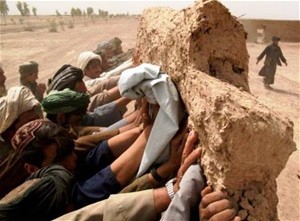
Workers topple the wall of an abandoned mud home.
USAID/CADG
Internally displaced persons undertake community improvement activities in spite of insurgent presence.
11 OCTOBER 2010 | ZHARI DASHT, KANDAHAR PROVINCE, AFGHANISTAN
The Internally Displaced Persons (IDP) Camp in Zhari Dasht District, Kandahar Province, is home to more than 7,000 refugees who fled their villages due to war and drought. Most of these IDPs are unemployed or rely on financial support from family members who leave the camp to seek work in Kandahar City, Pakistan, or Iran. At the same time, much of the camp infrastructure no longer in use is dilapidated and dangerous. USAID took action to address these problems simultaneously by hiring the camp residents to work on making community improvements.
With the support of the Governor of Kandahar Province, the Kandahar Provincial Development Council, the Afghan Ministry of Refugees and Returnees, and the United Nations High Commissioner for Refugees, USAID is employing more than 1,500 IDPs to demolish more than 1.5 million square meters of abandoned and decaying mud homes through its Food Insecurity Response to Urban Populations (FIRUP) project. In addition, the workers are leveling a critical nine-kilometer road to link the camp with the Hirat Highway, a major transportation route. The project, which will generate more than 950,000 Afghani ($475,000), is the first of its kind in a district fraught with insurgent activity.
In addition to improving community life and linking the camp to transportation routes, the project allows IDP residents to support their families without leaving for extended lengths of time. One laborer explained, “I have a brother, mother, and father to support. I used to live and work in Pakistan and send them money for food. Now, I can be with them and provide for them.” The project is empowering these refugees to improve their living conditions, even while the area continues to struggle against insurgent elements. This activity will help pave the way for more sustainable aid and development efforts in this and other unstable districts.
USAID’s FIRUP project promotes stability through temporary employment and income generation opportunities in targeted populations to reduce the number of food-insecure and/or unemployed Afghans who might otherwise turn to the insurgency or other illicit activities for income.







Comment
Make a general inquiry or suggest an improvement.